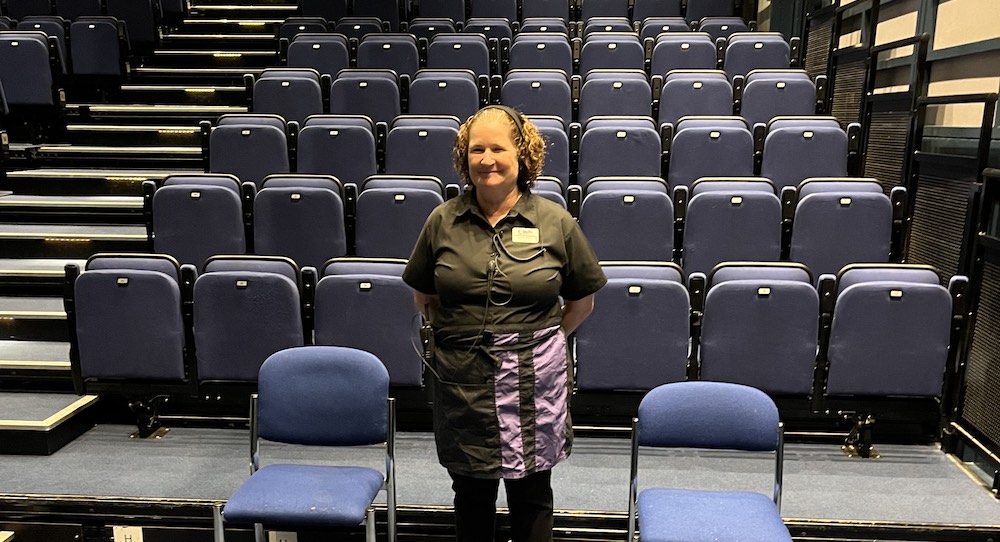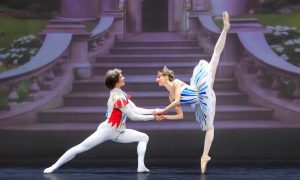Until the endless rounds of auditions start getting me down….
Until an injury means I’m out for several months….
Until the age clock catches up with me…..
Until I reach a point where I need a more stable income…
These statements might not apply to you, but there can be many reasons why professional dancers might turn to alternative jobs and careers, yet keeping within the theatrical world that they know and belong to.
Let’s take a look at a day in the life of professionals working in dance-related careers. Which of these creative pathways could you take envisage taking yourself?
Perhaps remembering your own training days and encouraging the next generation might be up your street. Alan Bradshaw is an All England Dance (AED) adjudicator and is looking forward to an exciting AED forum in the new year. He reveals his enthusiasm for giving each dancer an individual report for the dances they perform, sending them off with something to work on — being a tiny piece of the puzzle that keeps them progressing.

“I absolutely love adjudicating,” he says. “I love that young performers can learn about themselves through entering solos across a wide range of disciplines, whilst also being part of duets, trios and groups, learning valuable partnering skills. I like being ‘human’ as an adjudicator — showing them it’s never about being perfect, but about being passionate and consistent in their approach.”
Madeleine Shea has always worked in the industry. She finds adjudicating so rewarding, she has spent the last 40 years doing so and travels across the UK. In January, she will be adjudicating in Hertfordshire, then all the way down in Dorset by February. “There are so many highs, and not many lows to be honest,” she shares. “It is an honour and privilege to stand in judgment of good quality teaching.”
A busy Christmas season approaches for Shea, who is also an examiner for the International Dance Teachers Association (IDTA). She has examined for several leading dance organizations including online and videoed examinations. She examines extensively both in the UK and abroad, and holds numerous teaching qualifications with the Imperial Society of Teachers of Dancing (ISTD) and four Fellowships with the IDTA. An inspiring resume!
If varied travel sounds appealing to you, Jill Redford had always aspired to move into examining and was fortunate to be selected to attend the examining course for ISTD Modern Theatre and Tap. She has now been examining for 25 years and is still expanding her journey by training to examine ISTD Imperial Classical Ballet.

“One of the things I love most about examining is where the work takes me,” Redford says. “I have been fortunate to travel across the world examining, including Mexico, Malta, Luxemburg and Italy, to name a few. It is always a privilege to witness the dedication of teachers and the talent of their students.” As the year moves towards a close, she will be travelling to examine in Scotland, the end of the winter term being a very busy yet rewarding time.
Behind the scenes might be a completely different but attractive evolution. Rob Armstrong gives an insight to working as a backstage venue technician. Hours can be long and duties varied, depending on the production. Maintenance tasks include preparing the venue for an incoming show or sweeping or mopping the stage floor. Or rigging lighting, or pyrotechnics, set-building, or unloading lorries and hanging cloths and flats.
Armstrong loves being part of a team that ‘makes the impossible possible’ and leaves an audience leaving the theatre having had a truly one-off experience. As a former dancer, he is often able to surprise people with knowledge they would assume he didn’t have, offering help and tips normally outside of a technician’s experience. As pantomime season creeps nearer, Armstrong will be returning to Milton Keynes to work for pantomime and looks forward to catching up with friends from past years who have become like family.
“We’re together for long days over five to six weeks and can form some great friendships,” he explains. “I feel that I can still contribute to the performance and the day this magical, challenging, rewarding and unpredictable work I do feels like a ‘job’ will be the time for me to look for something that pays better and allows time for a ‘real’ life.”

What about front of house as another option? There are many differing roles involved in running a theatre. A member of the box office staff at a major London theatre reveals they had always worked in performance venues and enjoyed administrative work. Having studied performance, they wanted to stay within the theatre ambience, experiencing other sides of it, and enjoying benefits such as staff discount on tickets, and complimentary tickets for selected shows.
If you’ve got great interpersonal skills and would love the opportunity to see lots of shows, working as an usher might be ideal for you. Usher roles can be paid or voluntary, and Linda Hunt describes a typical shift at The Hawth Theatre, South-East England.
“We usually arrive an hour before the show to be briefed on any issues, use of haze or flashing lights and any audience needs, particularly regarding access,” explains Hunt. “We then take a bucket to our assigned door, containing cleaning materials, exit flyers and high viz in case of an emergency evacuation – ushers play a big role in this. A headset and radio is worn for staff communication and once auditorium doors are open, ushers check tickets and point customers in the direction of their seats.”
Hunt makes an interesting point that the work is on a zero-hours contract, meaning it can work alongside another job, or provide flexibility with family commitments. “An average shift would be 4.5 hours for one show. It’s a varied role and a great way to interact with customers who are on the whole, having a great time. Occasionally, there’ll be a difficult customer – we keep an eye out during the show in case anyone is not complying with the no photography rule, or if anyone has been taken ill or needs help.”
You might have other creative skills that can be utilised within the dance world. Photography or set design?

Annabella Ryrie Smith trained as a dancer and gymnast, graduating with a BA in Fashion Design and Business. She set up mobile dance shop AnnabellaRysm to utilise her dance background, business education and aspects of fashion design through designing and sewing ballet shoe bags and scrunchies, ribbon servicing and bespoke costume design. Smith designs and sells printable dance teacher resources on Etsy and is preparing seasonal products in time for Christmas.
“A typical shop day starts with preparation of my stock at home, loading up the car, setting up shop and meeting and greeting new faces,” she says. “Throughout the day, I fit ballet, tap and jazz shoes and leotards for students. It’s fun to use my dance knowledge and stay involved in the dance community.”
It’s an ever-increasing pool of opportunities! Have any of these dance-related jobs sparked your interest, or inspired you to think of your own possible progressions? How wonderful to be able to incorporate dance passion into a career, as a sideline, or the main chapter of our working life. Enjoy the continued journey of your dance career into the new year, whichever track you travel on!
By Louise Ryrie of Dance Informa.














